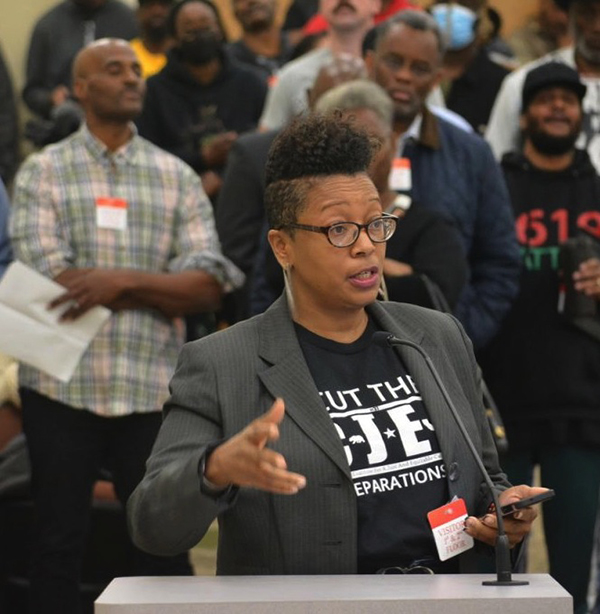By Sue Favor
Contributing Writer
Many have struggled to successfully re-enter the workforce after incarceration, but a new county program aims to bridge that gap.
The L.A. County Office of Diversion and Reentry has partnered with six community organizations to launch a job-training program called Skills and Experience for the Careers of Tomorrow (SECTOR). The initiative aims to help those who have been to jail or prison develop the skills they need for well-paying jobs with career advancement opportunities.
It is the first year of what the office hopes are many for the $4 million program, funded from the 2014 initiative Proposition 47. The measure reduced low-level crimes from felonies to misdemeanors, and passes the savings from incarceration to mental health counseling, diversion training, job training and other services.
Through SECTOR, adults 18 and older who have been arrested, charged with, or convicted of a criminal offense and who have struggled with mental health challenges or substance use disorder can receive skills training and paid work experience for careers in growing fields that offer opportunities for advancement.
“The SECTOR program is focusing on high-growth sectors in Los Angeles that offer career pathways and good wages,” said Kate Vacanti, senior manager of reentry workforce initiatives in the Diversion and Reentry Office.
That includes technology, health care, social assistance, manufacturing, construction, leisure and hospitality, green jobs, arts and entertainment, government, transportation and logistics.
“The goal is to connect people to entry-level employment where they can grow and advance up the ladder in that sector,” Vacanti said. “Examples of some of the positions we’re training for include: apprentice with the building trades, solar installation specialists, clerical positions with LA County government, community health workers, digital animators and truck drivers.”
The involved agencies include Chrysalis of South LA and Friends Outside in Los Angeles County, in Inglewood. The Reentry Office also partners with corrections agencies, America’s Job Centers of California and other county agencies to recruit participants. Those interested in a specific career pathway, and who can commit to the hours of the program, can apply through the agency closest to them.
The program offers financial assistance, as well as supportive services such as mental health services and career coaching from staff members who have experienced the justice system. It aims to serve 500 participants in its first year.
“It’s impossible to overstate the importance of a good job to success after jail or prison, but persistently high unemployment rates for people with justice involvement tell us just how big a challenge they still face,” said Peter Espinoza, director of the Reentry Office and a former Superior Court judge. “For people facing those obstacles, SECTOR will give them a path to a career, and the support they need as they walk that path — and that can mean the difference between successfully rejoining society or returning to the justice system.”
To ensure that participants remain financially stable through the training period, SECTOR provides stipends, paid work experience and incentive payments for program participation and job retention.
A unique feature of the SECTOR program is that it also offers mental health support and access. Cognitive Behavioral Intervention-based therapy group sessions help participants build skills that can help them avoid recidivism, as well as solve issues in the workplace.
Vacanti said the use of cognitive behavior interventions can help participants recognize the connection between thoughts, feelings and behaviors, recognize situations that trigger unwanted behavior, and practice new thinking and coping skills that deter problem situations and facilitate success on the job.
Cognitive Behavioral Intervention “group sessions focused on employment goals will help SECTOR participants practice problem-solving skills they can use when they encounter challenging situations in the workplace,” Vacanti said. “These skills will help participants not only get the job, but maintain it and advance their careers.”
Chrysalis President and CEO Mark Loranger said this whole-person approach was a natural fit for that organization, which provides cognitive behavioral intervention to clients.
“Having a trauma-informed approach to how we interact with each other, and in the workplace, can be essential to our success as individuals,” he said. “Searching for employment can be stressful — especially if you have barriers to navigate, such as history with the justice system. We believe supportive services that consider mental health can really make a difference.”
Applicants can contact Vacanti, or one of the involved organizations.
http://file.lacounty.gov/SDSInter/dhs/1103163_SECTOR_Flyer_Final_Color.pdf
Sue Favor is a freelance reporter for Wave Newspapers, who covers South Los Angeles. She can be reached at newsroom@wavepublication.com.
“It’s impossible to overstate the importance of a good job to success after jail or prison.”
— former Judge Peter Espinoza













